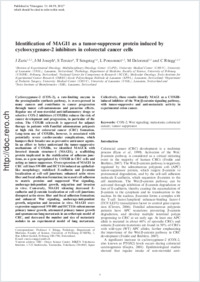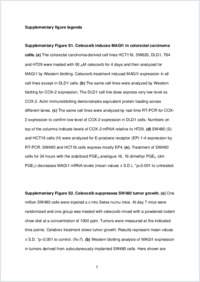Identification of MAGI1 as a tumor-suppressor protein induced by cyclooxygenase-2 inhibitors in colorectal cancer cells
- Zaric, J. Division of Experimental Oncology, Multidisciplinary Oncology Center (CePO), University Medical Center (CHUV), University of Lausanne (UNIL), Lausanne, Switzerland - Pathology, Department of Medicine, Faculty of Science, University of Fribourg, Switzerland - National Center for Competence in Research (NCCR), Molecular Oncology, Swiss Institute for Experimental Cancer Research (ISREC)-Ecole Polytechnique Fédérale de Lausanne (EPFL), Lausanne, Switzerland
- Joseph, J.-M. Department of Pediatric Surgery, University Medical Center (CHUV), University of Lausanne, Switzerland
- Tercier, S. Department of Pediatric Surgery, University Medical Center (CHUV), University of Lausanne, Switzerland
- Sengstag, T. Swiss Institute of Bioinformatics (SIB), Lausanne, Switzerland - OSC—Omics Science Center, RIKEN Yokohama Institute, Japan
- Ponsonnet, L. Division of Experimental Oncology, Multidisciplinary Oncology Center (CePO), University Medical Center (CHUV), University of Lausanne (UNIL), Lausanne, Switzerland - Pathology, Department of Medicine, Faculty of Science, University of Fribourg, Switzerland
- Delorenzi, M. National Center for Competence in Research (NCCR), Molecular Oncology, Swiss Institute for Experimental Cancer Research (ISREC)-Ecole Polytechnique Fédérale de Lausanne (EPFL), Lausanne, Switzerland - Swiss Institute of Bioinformatics (SIB), Lausanne, Switzerland
- Rüegg, Curzio Division of Experimental Oncology, Multidisciplinary Oncology Center (CePO), University Medical Center (CHUV), University of Lausanne (UNIL), Lausanne, Switzerland - Pathology, Department of Medicine, Faculty of Science, University of Fribourg, Switzerland - National Center for Competence in Research (NCCR), Molecular Oncology, Swiss Institute for Experimental Cancer Research (ISREC)-Ecole Polytechnique Fédérale de Lausanne (EPFL), Lausanne, Switzerland
-
13.06.2011
Published in:
- Oncogene. - 2012, vol. 31, p. 48-59
English
Cyclooxyganase-2 (COX-2), a rate-limiting enzyme in the prostaglandin synthesis pathway, is overexpressed in many cancers and contributes to cancer progression through tumor cell-autonomous and paracrine effects. Regular use of non-steroidal anti-inflammatory drugs or selective COX-2 inhibitors (COXIBs) reduces the risk of cancer development and progression, in particular of the colon. The COXIB celecoxib is approved for adjunct therapy in patients with Familial adenomatous polyposis at high risk for colorectal cancer (CRC) formation. Long-term use of COXIBs, however, is associated with potentially severe cardiovascular complications, which hampers their broader use as preventive anticancer agents. In an effort to better understand the tumor-suppressive mechanisms of COXIBs, we identified MAGUK with Inverted domain structure-1 (MAGI1), a scaffolding protein implicated in the stabilization of adherens junctions, as a gene upregulated by COXIB in CRC cells and acting as tumor suppressor. Overexpression of MAGI1 in CRC cell lines SW480 and HCT116 induced an epithelial-like morphology; stabilized E-cadherin and β-catenin localization at cell–cell junctions; enhanced actin stress fiber and focal adhesion formation; increased cell adhesion to matrix proteins and suppressed Wnt signaling, anchorage-independent growth, migration and invasion in vitro. Conversely, MAGI1 silencing decreased E-cadherin and β-catenin localization at cell–cell junctions; disrupted actin stress fiber and focal adhesion formation; and enhanced Wnt signaling, anchorage-independent growth, migration and invasion in vitro. MAGI1 overexpression suppressed SW480 and HCT116 subcutaneous primary tumor growth, attenuated primary tumor growth and spontaneous lung metastasis in an orthotopic model of CRC, and decreased the number and size of metastatic nodules in an experimental model of lung metastasis. Collectively, these results identify MAG1 as a COXIB-induced inhibitor of the Wnt/β-catenin signaling pathway, with tumor-suppressive and anti-metastatic activity in experimental colon cancer.
- Faculty
- Faculté des sciences et de médecine
- Department
- Médecine 3ème année
- Language
-
- English
- Classification
- Biological sciences
- License
-
License undefined
- Identifiers
-
- RERO DOC 28188
- DOI 10.1038/onc.2011.218
- Persistent URL
- https://folia.unifr.ch/unifr/documents/302290
Other files
Statistics
Document views: 106
File downloads:
- pdf: 251
- Supplementary material: 148

